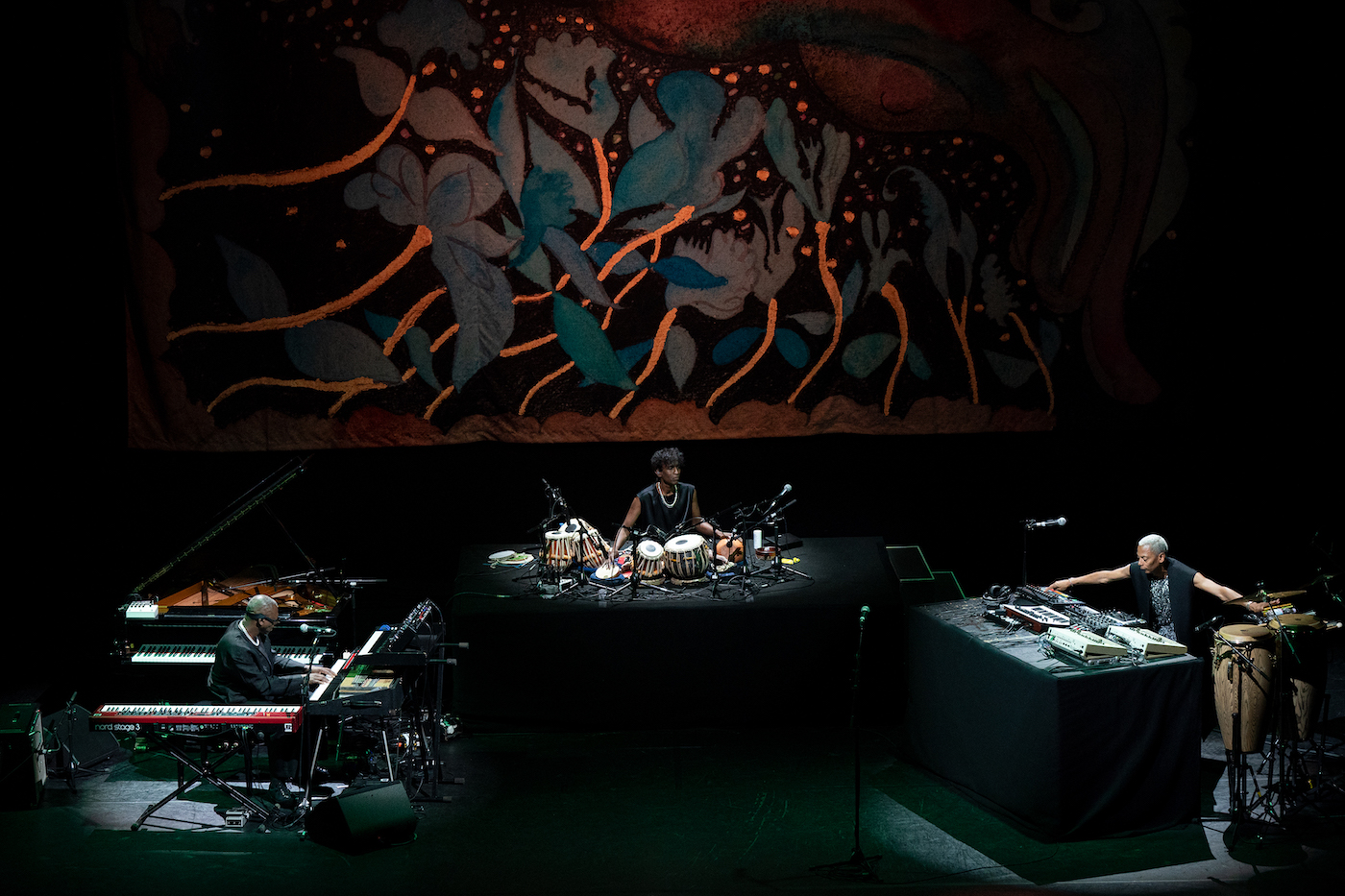"The Atmosphere That We All Create Together": Jeff Mills On His Legacy, DJ-ing As Non-Verbal Storytelling & More

10 February 2024
“A legacy isn’t something I can really direct or participate in,” Jeff Mills writes back to me on a week that started with the now-considered-dying Pitchfork rating his 1996’s ‘Live at the Liquid Room, Tokyo’ a rare 10 out of 10, and would conclude with the producer, DJ, label-head and dance music legend performing in India for the first time. “It’s for others more than myself.”
The mix, found only as unofficial uploads on the internet and described in the said review as “the Techno Bible, unequivocally The One”, is arguably the glorious peak of Mills’ early techno legacy. Leading up to it, he had pioneered a minimal form of the genre alongside Detroit-mate Robert Hood, developed a loyal following through his residency at Berlin’s then-fledgeling Tresor and redirected the course of techno from his native city of Detroit with the Parliament bassist ‘Mad’ Mike Banks as Underground Resistance, nudging the genre towards grittier realms with the help of militant outfits and political messaging.
Prioritising energy over pristineness, including the audience in the process of phasing kicks coming together, the mix blazes through selections – sometimes barely offering more than a glimpse of some. They become more of a connecting component, featured less for their standalone value and more for their role in a greater whole that is the DJ set.
The breakneck mixing style finds its roots in the earliest chapters of Mills’ story when he was known as ‘The Wizard’, championing Detroit's talent, passionately finding the freshest releases from hip-hop to industrial, and informing the local tastes through his radio mixes. As if the deitifying by thousands (maybe millions?) of dance music fans wasn’t enough, Mills' early legacy also figures in Eminem’s verses with the lines: “discovered this DJ who was mixing, I say it to this day, if you ain't listened to the Wizard, you ain't have a fucking clue what you was missing”
As radio slots shortened while championable music remained abundant, Mills started mixing and moving through the selections quickly to develop his fast approach on turntables and mixing desk. It was also at the radio where Jeff Mills the music-maker developed his conceptual style as he opted to edit tapes and stitch together library sounds in his shows to communicate on air instead of speaking. The increasing competitiveness between stations meant Mills had to distinguish his selections, bringing in drum machines and keyboards to layer over records or create bespoke passages earlier on the same day.
Visceral rhythms of 909s would underline abstract emotive layers when he finally started releasing his productions. More than a beat to move to, there’d always be a story running underneath whether as the sweeping tones accompanying the incessant distorted kicks of ‘The Hacker’ from the seminal ‘Waveform Transmission, Vol. 1’ or the cinematic strings of ‘Utopia’ from ‘Cycle 30’.
Decades later, after feats like re-scoring Fritz Lang’s silent film ‘Metropolis’, performing with the Montpellier Philharmonic Orchestra and celebrating 50 years of the moon landing with NASA, Mills’ music continues to either look inward or to a distant future. 2023’s ‘The Other Maria’ is about the often-restrained and potentially chaotic part of us that deals in hard truths and raw unrestricted emotion, while 2019’s ‘Moon: The Area of Influence’ discusses the effects of the moon on our lives and culture. Three decades on, it’s still the same sounds of 909s and analog pads that mark the sonic palette of Mills but the results are even more abstract and less frequently reminiscent of shaking walls in a raving warehouse.
“I developed a sense to understand sound in cluster arrangement more than ever. I also understand the barriers due to sectionalizing between genres are becoming less. That musicians could and want to play with each other more,” addresses Mills, talking about how his futurism and sci-fi-influenced work has changed as the technology and idea of the future itself have evolved. “I hear music differently now as a result of the way we communicate. Also, the amount of information we can engage with in such a short amount of time has had an effect.”
Techno is not just for dancing, is the philosophy that Mills has been espousing over the years. “If you can dance to it, that's great, that's a bonus, but music should say something. It should be made in a manner with seriousness, and that would enlighten someone simply by listening to it,” he has told Vice in the past. It is what also guides him as a label-head with his Axis Records. Initially a platform for Mills' own work (under his various guises), it has grown since the COVID-19 pandemic to platform talent from the world over including the debut album by India’s own techno frontrunner Arjun Vagale. “Having strong visions about the future isn’t privy to any particular country or city so, it was just a matter of coincidence. In this respect, no place on Earth is distant or remote. We’re all quite close to one another as we occupy the small patch of this Planet’s landmass,” he tells me.
Behind the decks, the story isn’t much different. Cuts from other techno pioneers like Kevin Saunderson, Robert Hood, Eddie Fowlkes and Phuture intercut with Mills’ original (often extremely fresh) bits and fresher talent with similar substance to their music. The focus continues to remain on overarching energy as much as the selections if not more so as the mixing can go from boldly sudden to so subtle you’d hardly notice.
“DJ sets are generally for dancing, but also can be widened to be considered as a non-verbal story about ‘The Fantastic’, ‘The Amazing’ or depending [on] how clever the DJ is, even ‘The Unbelievable’”, he says, explaining how a successful set is about giving the audience a sensation that wasn’t there before. That sensation is where the self-expression figures in. “I play based on how I feel at that time and it’s got nothing to do with anyone else. On occasion, not even the audience because my mind is somewhere far away,” he says, echoing the explanation he gave for Resident Advisor’s The Art of Djing, wherein he recalls sometimes using his set to describe what it might be like to approach a planet.
Yet, amidst the abstract tapestry of his sets, there are unmistakable points of recognition, where the selection itself becomes a focal point. While Mills argues, “I tend not to watch others to compare myself so, I can’t really say how I match up. This isn’t how I was taught to play music,” I see Mills able to create moments that only a few DJ-producers who have reached a certain stage of popularity with specific work can create. A moment similar to a rock or pop act “playing their hit”. For Mills’, that hit is ‘The Bells’, the popular and highly effective minimal work most recognisable through its sequence of melodic call and response. “I've tried not playing it, and people were sad! [laughs] So I kinda just gave up,” he says in The Art of DJing, going on to say how the track is a turning point in the set and now signifies that he is completely ready at his stations to kick proceedings into another gear.
Nevertheless, relying on hits isn't something easily associated with Mills. While he frequently performs at large-scale events (an easy and sometimes unnecessary prompt for derision from a chunk of the techno audience), much of his recent touring has been dedicated to a collaboration with tabla maestro Prabhu Eduoard and keyboardist Jean-Phi Dary, extending the 'Tomorrow Comes Harvest' project initiated with afrobeat pioneer Tony Allen.

Jean-Phi Dary, Prabhu Eduoard & Jeff Mills in Berlin || Photograph by Thomas Ecke
Instead of cashing on his status as a pioneering figure in techno, Mills continues to release a stream of new music that diverges starkly from his '90s output, even while operating within similar styles and using a familiar sonic palette. “I like the thought process of making something from nothing so, I really enjoy starting over again,” he adds.
Techno is more than just for dancing remains a recurring theme in his work and a harder thing to sell. “Music is such a suggestive medium that it’s just not possible to measure people’s appreciation level,” he says. “At times in my past, I remember being congratulated but also advised to “give it up - it’s not going to work”, “I’ve lost it and should stop” and many other discouraging things. So, I can’t put much value into what people say or what they appreciate. Instead, I only have to rely on what I feel is right and guide myself from this.”
That internal guiding compass remains the constant. It’s the same whether it was at Tokyo’s Liquid room, blazing through selections with hard stops and phasing rhythms 3 decades ago; or in Mumbai and Goa for Far Out Left this weekend – drawing from his more abstract cluster arrangements and talent he has sifted through for Axis Records after years of building a legacy that has inspired most in the lineup and an audience that might await ‘The Bells’. “We’re just in different places at different times, but the objective is all the same,” he says. “It’s not about me or them, but rather, it’s always been about “it”. The atmosphere that we all create together.”
.
.
Words by Amaan Khan
Photo by Jacob Khrist
